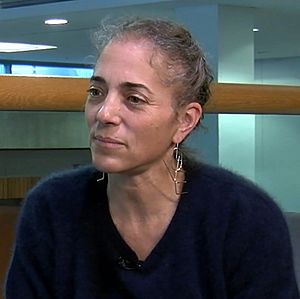Deborah A. Thomas facts for kids
Quick facts for kids
Deborah A. Thomas
|
|
|---|---|

Thomas in 2019
|
|
| Born | 1966 (age 58–59) |
| Nationality | American |
| Education | Brown University (BA) New York University (MA, PhD) |
| Occupation | Professor of Anthropology, Director of the Center for Experimental Ethnography |
| Organization | University of Pennsylvania |
Deborah A. Thomas (born 1966) is an American expert who studies people and cultures, called an anthropologist. She is also a filmmaker. She teaches anthropology at the University of Pennsylvania. There, she also leads the Center for Experimental Ethnography.
Deborah Thomas has written books and articles about the history, culture, and politics of Jamaica. She also studies human rights and how the world is connected in the Caribbean. She has helped make two experimental films. She also helped create a special exhibit at the University of Pennsylvania Museum of Archaeology and Anthropology. From 2016 to 2020, she was the main editor for a big journal called American Anthropologist.
Before becoming an anthropologist, Thomas was a professional dancer. She danced with a group called Urban Bush Women in New York. This dance company used art to help make society fairer. They showed the experiences of people who were not treated equally.
Education and Early Career
Deborah Thomas went to Brown University. She earned her first degree in Semiotics in 1988. Semiotics is the study of signs and symbols.
She then continued her studies at New York University. She earned a master's degree in 1994. In 2000, she received her PhD in Anthropology. Her PhD research looked at how identity and politics mixed in Jamaica in the 1990s. This research became her first book, Modern Blackness.
After teaching for a short time at NYU, Thomas worked at Wesleyan University. In 2006, she became an Associate Professor. Later that year, she joined the Anthropology Department at the University of Pennsylvania. In 2011, she became the R. Jean Brownlee Professor of Anthropology.
Her Research and Films
Deborah A. Thomas has written three books. She has also edited one book. Her work mostly focuses on Jamaican culture and politics. She has studied the "rude boy" street culture in Kingston, Jamaica. These young men often got their style from old Hollywood cowboy and gangster movies. They also found inspiration in jazz and soul music.
Her research also looks at the lasting effects of violence from colonial times. She studies how difficult experiences can affect memory in Jamaica today. Sometimes, she connects Jamaican music, violence, and politics in her studies.
Deborah A. Thomas has also directed and produced films. These films are connected to her research. Her first film was Bad Friday: Rastafari after Coral Gardens (2011). This film used old records and stories from older Rastafari people. It explored how violence and past traumas still affect Jamaican politics and beliefs.
Her second film was Four Days in May (2018). This film also mixed visuals and written materials. It allowed people to share their memories of loved ones. These loved ones died during a difficult time in Kingston, Jamaica, in May 2010. Thomas calls this film a work of "experimental ethnography." This means it's a new way of studying cultures using different types of media.
In 2018, Thomas became the Director of the Center for Experimental Ethnography. This center is at the University of Pennsylvania. It encourages using different media, like videos and digital tools. This helps share knowledge in the humanities and social sciences.
Museum Exhibit
Deborah A. Thomas also shared her research through a museum exhibit. It was called Bearing Witness: Four Days in West Kingston. The University of Pennsylvania Museum of Archaeology and Anthropology showed it from 2017 to 2020.
The exhibit used audio and video. It showed real stories from people who experienced the "Tivoli Incursions." These events happened in Tivoli Gardens in Kingston, Jamaica, in May 2010. The exhibit was like an art show, a memorial, and a call to action. It helped people understand how violence affected this Jamaican community.
This exhibit grew from a project called "Tivoli Stories." Thomas led this project in 2012 with other researchers.
In her work, Thomas often asks a big question: "What histories do we inherit?" This question guides much of her research. In 2024, she was chosen to join the American Academy of Arts and Sciences.

